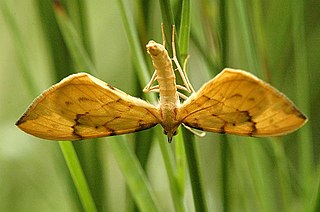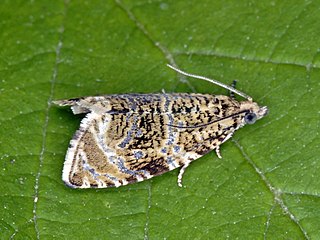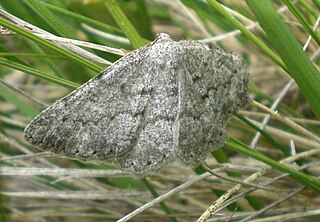
The barred straw is a moth of the family Geometridae. The species was first described by Michael Denis and Ignaz Schiffermüller in 1775. It is sometimes placed in the genus Gandaritis. It is found throughout the Palearctic region, including Britain and Ireland, and also the Near East.

The white-shouldered house moth is a species of gelechioid moth. It belongs to the subfamily Oecophorinae of the concealer moth family (Oecophoridae), just like the brown house moth. Though several presumed congeners of E. sarcitrella were described, its genus Endrosis is currently understood to be monotypic.

Alsophila is a genus of the moth family Geometridae, subfamily Alsophilinae. The genus was erected by Jacob Hübner in 1825. The genus is notable because of distinct sexual dimorphism leading to strongly reduced wings in females, so much so that they cannot fly. The moths fly in late autumn or early spring.

Argyresthia pygmaeella is a moth of the family Yponomeutidae. The species was first described by Michael Denis and Ignaz Schiffermüller in 1775 from a specimen found near Vienna, Austria

Syricoris lacunana, the dark strawberry tortrix, is a small moth species of the family Tortricidae. It is found in the Palearctic realm.

Cnaemidophorus rhododactyla, also known as the rose plume moth, is a moth of the superfamily Pterophoroidea, family Pterophoridae. It is found in the Northern Hemisphere, except for Greenland, Southeast Asia, and most of North Africa. It was first described by Michael Denis and Ignaz Schiffermüller, 1775.

The March dagger moth is a moth of the subfamily Chimabachinae. It is found in Europe and was first described by Michael Denis & Ignaz Schiffermüller in 1775.

Cymatophorina is a monotypic moth genus of the family Drepanidae first described by Arnold Spuler in 1908. Its only species, Cymatophorina diluta, the oak lutestring or lesser lutestring, was described by Michael Denis and Ignaz Schiffermüller in 1775. It is found in much of Europe, with subspecies Cymatophorina diluta hartwiegi occurring in Britain.

Agriphila is a genus of small moths of the family Crambidae. It was first described by Jacob Hübner in 1825. They are common across temperate Eurasia and in adjacent regions.
Paracorsia is a monotypic moth genus of the family Crambidae described by H. Marion in 1959. It contains only one species, Paracorsia repandalis, described by Michael Denis and Ignaz Schiffermüller in 1775. It is found in most of Europe, except Ireland, Fennoscandia and the Baltic region. It has also been recorded from central Asia, including Iran and Kyrgyzstan and North America where it has been recorded in southern Ontario and northern Indiana.

Calymma is a monotypic moth genus of the family Erebidae erected by Jacob Hübner in 1823. Its single species, Calymma communimacula, was first described by Michael Denis and Ignaz Schiffermüller in 1775. It is found in central and southern Europe and from Turkey to Transcaucasia and the Middle East.

Hoplodrina is a genus of moths of the family Noctuidae.

Catephia alchymista, the white underwing or alchymist, is a moth in the family Erebidae found in Asia, Europe and North Africa. The species was first described by Michael Denis and Ignaz Schiffermüller in 1775.

Elophos is a genus of moths in the family Geometridae.

Therapis is a monotypic moth genus in the family Geometridae first described by Jacob Hübner in 1823. Its only species, Therapis flavicaria, was first described by Michael Denis and Ignaz Schiffermüller in 1775. It is found in south-eastern and eastern Europe, east to Turkey, Russia and Georgia.

Philedone is a genus of moths belonging to the subfamily Tortricinae of the family Tortricidae. It contains only one species, Philedone gerningana, the cinquefoil tortrix or cinquefoil twist, which is found in Asia and Europe. It was first described by the Austrian lepidopterists Michael Denis and Ignaz Schiffermüller in 1775.

Mompha is a genus of moths in the family Momphidae that was first described by Jacob Hübner in 1819. It has four subgenera.
















